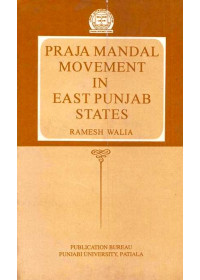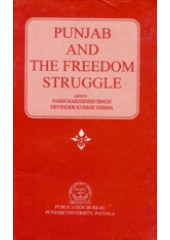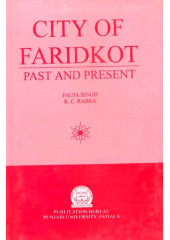Monday to Saturday - 10:00 Am to 9 PM
Now Enjoy Bulk Discounts on Books as Mentioned Below
These Discounts are in addition to the Discounts on Individual Books (Visible as Bulk Discount for Books in Cart)
Extra 10% Off If Books Purchased Exceeds Rs 3000 or 75 USD or 60 GBP or 60 Euro or 100 AUD or 100 CAD
Extra 15% Off If Books Purchased Exceeds Rs 6000 or 150 USD or 120 GBP or 120 Euro or 200 AUD or 200 CAD
Extra 20% Off If Books Purchased Exceeds Rs 15000 or 225 USD or 180 GBP or 180 Euro or 300 AUD or 300 CAD
Extra 25% Off If Books Purchased Exceeds Rs 30000 or 300 USD or 240 GBP or 240 Euro or 400 AUD or 400 CAD
Foreword To The Book 'Praja Mandal Movement In East Punjab States' By Ramesh Walia
I have great pleasure in being asked to write the Foreword to Dr. Ramesh Walia's book, Praja Mandal Movement in East Punjab States. The present work is the author's doctoral thesis which was prepared under my personal supervision and guidance. To the best of my knowledge it is the first scientific and detailed study of the subject, and as such is a valuable contribution to historical knowledge.
The roots of the Praja Mandal movement in East Punjab States are traceable to the Singh Sabha movement which through its vigorous programme of reform in the fields of religious practice, social custom and education created a deep impact on Sikh society irrespective of territorial boundaries. All Sikhs, whether they resided in the British Punjab, in Punjab States, or anywhere else, came under the enlightening and reinvigorating influence of the Singh Sabha movement and found a new cansciousness surging up within them. It was because of this new phenomenon that when the community was confronted with a serious challenge in the form of British protection of mahants and pujaris notorious for mismanagement of gurdwaras and misuse of their funds, the people of East Punjab States felt as much concerned and volunteered to make sacrifices as readily as their brethren in the British-ruled areas of the Punjab did.
This thing had no direct link with anything seditious against the Rulers of the States but they were shrewd enough to read in the new developments a potential danger to their administrations and took stern measures against all such people as were participating, or had participated, in the Akali agitation for gurdwara reform. The Akali leaders, on the other hand, reacted to these repressive measures by giving a new dimension to their movement and turning it against the Rulers' persons and administrations. The birth of a new political force was the natural result of such a situation.
To begin with, the Punjab Riasti Praja Mandal, as the new organization was called, focussed its attention on political issues such as liberty of movement and speech and misuse of State finances by the Rulers, particularly Maharaja Bhupinder Singh of Patiala. To reinforce their struggle, the organizers affiliated their Praja Mandal to the All-India States' Peoples' Conference which was brought into being about the same time and established close contacts with the Indian National Congress, the most powerful freedom-fighting force in the country.
Under the influence of such extraneous forces as mentioned in the foregoing paragraph and also by ,the force of circumstances the Praja Mandalists gradually widened their mental horizon and defined their political goal in terms of attainment of democratic and constitutional rule in the States.
The movement, in its early stages, was village-based and Akali-backed, After a time the political situation in the Punjab began to undergo a radical change. With the prospect of transfer of power looking closer, the communal tangle in the area acquired a new poignancy and the different communites found themselves deep in the game of self-consolidation and self-aggrandizement. The logic of the situation compelled the Shiromani Akali Dal under the leadership of Master Tara Singh to come to terms with the Ruler of Patiala State. With the Akali volte face a major change appeared in the character of the Praja Mandal leadership. The void caused by the departure of the Akalis was filled by a new leadership drawn from urbanite Hindus and communists working in the countryside.
With the coming in of the town-dwelling Hindus, the democratic goals of the movement were redefined in more definite and explicit terms. All ambiguity regarding the pattern of government desired, was now resolved. But what imparted real depth to the movement was the organization of poor peasants and tenants under the banner of communist and other leftist leaders and their assertiveness against the feudalistic order of the States. Several Kisan morchas were organized to press their demands against the absentee landlords (Biswedars) and on quite a few occasions a measure of success was also achieved.
The Indian National Congress seldom went beyond extending its moral support to the States' peoples' movement. All the same, even this moral support was a source of strength to the Praja Mandalists. How valuable it was, became absolutely clear at the dawn of lndependence in 1947. The whole ethos was now changed. With the Congress seizing the reins of power in the rest of India, the cause of Indian Princes was lost for ever and they had no other course left to them than to fall in line with the surrounding areas and accept the demands of their people.
With the formation of Pepsu all Princes in East Punjab States except the Maharaja of Patiala were eliminated. Even the Patiala Ruler was no more than the constitutional head of the State and the real power passed into the hands of peoples' representatives. In 1956 on the reorganization of the States the separate individuality of Pepsu was finished and it was merged with the Punjab. With this even the constitutional position of the Maharaja of Patiala was ended. But the end of that status was in fact the end of one era and the beginning of another. Well could the Praja Mandalists now claim that they had achieved the consumation of the great struggle which they had launched nearly thirty years earlier.
I am glad to say that the author of this book has made a genuine attempt to study the subject in historical perspective.
I am sure that the work will provoke our researchers to probe the matter deeper and illumine the obscure corners of this fascinating historical problem.
FAUJA SINGH
Deptt. of Punjab Historical Studies,
Punjabi University,
Patiala
Praja Mandal Movement In East Punjab States - Book By Ramesh Walia
- Brand: Punjabi-University-Patiala
- Product Code: SHE276
- Availability: In Stock
-
Rs.200.00
Related Products
Sunset of The Sikh Empire - Book by Sita Ram Kohli
Table of Contents For 'Sunset of The Sikh Empire' - Book by Sita Ram Kohli ..
Rs.425.00
History of The Naujavan Bharat Sabha - Book By Comrade Ram Chandra
Introduction To The Book 'History of The Naujavan Bharat Sabha' By Comrade Ram Chandra Yout..
Rs.495.00
The Sikhs and Transfer Of Power - Book By Dr. Kirpal Singh
Table of Contents For 'The Sikhs and Transfer of Power' - Book By Dr. Kirpal Singh &n..
Rs.180.00
Punjabi Heroic Tradition - Book By Satya M Rai
Summary Of 'Punjabi Heroic Tradition' By Satya M Rai To evaluate the heroic tradition of a ..
Rs.130.00
Punjab And The Freedom Struggle - Book By Parm Bakhshish Singh & Devinder Kumar Verma
Foreword To 'Punjab And The Freedom Struggle' By Parm Bakhshish Singh & Devinder Kumar Verma&nbs..
Rs.350.00
City Of Faridkot - Book By Fauja Singh
Introduction To The Book 'City Of Faridkot - Past and Present' By Fauja Singh One of the pr..
Rs.130.00
Kuka Movement - Freedom Struggle In Punjab - Book By Jaswinder Singh
Introduction To 'Kuka Movement , Freedom Struggle In Punjab' By Jaswinder Singh Four books co..
Rs.300.00
Dyarchy In Punjab - Book By Virinder Singh
Introduction To 'Dyarchy In Punjab' By Virinder Singh Dr. Virinder Singh's erudite analysis of th..
Rs.225.00
Tags: book by ramesh walia, praja mandal movement in east pu punjab, states, sikh, history, books, english










